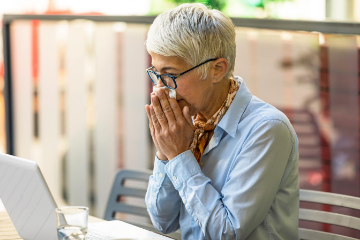News and Updates
Itchy eyes, runny nose and you can’t stop sneezing?
Summer can be especially challenging for those with seasonal allergies. The warmer weather marks the start of allergy season as pollen from trees, grass and weeds, and mould spores cause seasonal allergy symptoms.
“About 20 per cent of Canadians suffer from some kind of nose and eye allergies. Most of them have seasonal symptoms,” said Dr. Harold Kim, President of the Canadian Society of Allergy and Clinical Immunology. And, “this number may grow over time.”
Many Canadians have noticed their symptoms getting worse each year.
Experts believe it may be due to climate change and rising temperatures kicking pollen producing plants into overdrive and extending the growing season.
“The longer growing season results in overlapping seasonal allergy triggers and higher pollen counts,” said Dr. Kim.
For instance, while tree pollen is at its peak in the springtime months, it can last into early summer – just as grass season moves into high gear. But, don’t pass that tissue box just yet. Mid-summer moulds are just getting started and the dreaded ragweed season can start as early as August and last well into the fall.
What are the symptoms?
Seasonal allergy symptoms typically occur during certain times of the year. They can range from mild to severe and may include:
- Itchy, puffy, red and/or watery eyes
- Runny, stuffy and/or itchy nose
- Sneezing
- Itchy throat and/or ears
Not sure if your symptoms are related to seasonal allergies?
“Itchiness is typically a symptom specific to allergies,” said Dr. Kim, but recommends people consult with their primary health-care provider.
How can I manage my symptoms?
There are lots of ways to help you manage your seasonal allergy symptoms and safeguard your summer. Here are just a few suggestions:
- Minimize your exposure. Check your local weather network for pollen forecasts. When pollen counts are high, consider staying indoors.
- Air conditioning can help. Whether indoors or driving in your car, consider keeping your windows shut and turning on your air conditioner.
- Wear a mask when doing yard work.
- Don’t suffer in silence. If over-the-counter medications are not effective, ask your primary health-care provider if prescription medications like antihistamines, nasal sprays or eye drops may be right for you. In some cases, immunotherapy prescribed by an allergist may be suitable.
“Allergy symptoms can impact quality of life,” said Dr. Kim. Treatment options are available to help alleviate seasonal allergy symptoms. It’s important to consult your health-care provider to determine which options are best for you.
For coverage related eligibility, you can review your benefits booklet in My Library.





